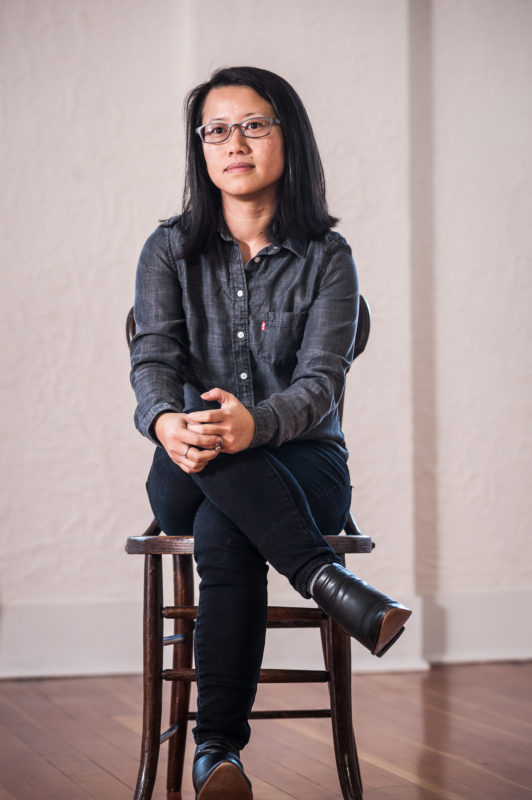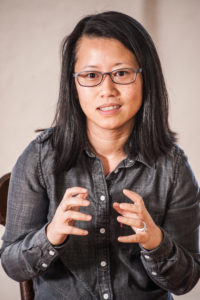This Girl Laughs, This Girl Cries, This Girl Does Nothing co-producers Tamara Carroll and Beth Thompson are passionate advocates for women. “Now, more than ever,” they say, “we need strong, complex female role models – we need women who carve their own path through the world, who learn through trial and error how to live a life of value, and who make choices unapologetically for themselves.” These role models exist in the form of triplet sisters Albienne, Beatrix, and Carmen onstage, and in so many other “real world” women. In honor of them all, Tamara and Beth commissioned Lava Alapai to photograph just a few of the strong, talented, fearless and complex women who make Portland a better place.
The first subject of the This Woman portrait series is Chi Nguyen-Ventura. An excerpt from her interview with Beth is below.

Chi Nguyen-Ventura is the kind of woman who makes you proud to be to an Oregonian. In part, because she is so proud to be one. Chi arrived in Oregon as an eight-year-old political refugee from Vietnam, “having never learned a lick of English prior to coming here” in 1990. Fast track to her twenties, (don’t worry, will come back to that courageous 8 year old), Chi and her then fiancee are both in the midst of their graduate studies and interning at the state capital while planning their wedding. When their officiant unexpectedly bailed, saying, “I prayed on it and I just don’t think I can go through with this (same sex marriage),” word got around the capital. The senator Chi’s wife was working for arranged a coffee meeting for the two of them with then Secretary of State Kate Brown.
“So, she sits down and does this 90 minute interview with us and next thing you know she’s like, ‘I’ll officiate your wedding, you don’t have to worry. Just tell me the time and the place.’ So here we are. Two immigrant kids. My wife is Salvadorian, first generation. Her immigrant story is crazy – she came running across the border for safety. And, here’s me; a political refugee, asylum, first generation. Here we are, Secretary of State Kate Brown was officiating our wedding. Oregon has such an open nature about it…What other country would you get that kind of access? To our government? Two little kids you know. She didn’t know if we were two crazy little kids.”

But, of course, they weren’t two crazy little kids. They were two ambitious, loving, hardworking first generation immigrants. This journey into internships at the Oregon State Capital, starting a successful business, marriage and parenthood wasn’t simple, of course.
“Back in the 80s, if you can believe it, their concept of ESL was, ‘Here’s your stack of cards. Here’s this machine with these big old headphones. Sit in front of it for 6 hours. And slide the cards through. Here’s a picture, it’ll say the word, you repeat it.’ I didn’t learn any of it. I learned more on the playground trying to figure out how to get along and get to know people. And from that moment, I knew there’s a problem. This thing is not working.”
Just after her family’s arrival, a second wave of immigrants came through. Knowing that the ESL system wasn’t working, Chi took the initiative to make the new kids feel welcome.
“Come hang out with me, and I’ll show you the nice girls. And, there were these American girls who really took us under their wings and taught us the way of life. And, I think that’s probably the point where I realized my calling is to help. I seek ways to help and answer problems.”
A spark. It was an experience that helped cultivate her commitment to others as well as her interest in large, macro structures.
“I guess it’s just stems from the moment of knowing I fit in this bigger macro scale. Realizing my small thing fits into a much bigger thing. And, if my small thing can be multiplied, then you’ve got a movement.”
Chi had been befriended by a this group of American girls and another immigrant from the first wave of immigrants from Vietnam after the war in the late 70’s.
“And then I felt like it was was my responsibility to pass it forward. It’s creating a positive feedback loop. Then, how can you find the lever to magnify and intensify that positive feedback loop? How can you add velocity? Make it fast, quicker, cheaper. Just make more of the goodness to drown out all the bad stuff, because you can easily go bad. I could have succumbed to a lot of bad. Inner-city Portland school, gangs were really bad, Madison back then was known for drive by shootings…I just silenced it. Because if you multiply the goodness and focus on that and come from this place of abundance then you don’t succumb to that negativity.”
That commitment to positivity and the belief that problems can be solved powerfully translates into Chi’s work in business and in public office. Chi’s business Auto-Medic, a mobile car care provider service in the Portland area, started in December 2010. It was a direct response to the market crash and the friends and family who suddenly found themselves unemployed and underwater on their mortgages.
“It was the worst time to start a business, but I did it purely because there were displaced and unemployed friends and family in hospitality and construction. And, I was just like, ‘Well, if you can clean a toilet than you can clean a car. If you can lay a hardwood floor than I’m sure you can do an oil change.’ So, we just launched it. And, next thing you know three years had passed, five years had passed. We did no advertising, we just kept our heads down and did the work. We just invested in our people. I’ve helped ex-convicts, I’ve helped homeless folks, I’ve help domestic violence survivors. The goal is just Do Good. Doing good naturally fires and attracts more good to come forth.”

Chi came through a really awesome Portland training program, Emerge Oregon, that prepares Democratic women to run for public office. She ran for a seat on the King City City Council. When she was appointed to City Council, “I might as well have walked in as a three headed purple dinosaur.” The council’s average age was in the 80’s, she was the second woman, and the only Democrat. And her reining perspective was, “We all want public safety and good education and a good healthcare system for our fragile. Then, all of sudden it’s not the differences that we’re focusing on. We all want to the same thing and how can we get there. We might fight about how we can get there. But in the end, don’t we want to get there? Okay. Let’s work together.”
I asked her about the work of being a woman in two spheres that are still well dominated by men. She said, “I’ve really just led the way with letting my hard work earn and speak for itself. Yeah, like, meritocracy really. I’ve just kept my head down and don’e the right thing, do the hard work, do the things people don’t want to do, do the things that people shy from. When people run out, I’m the one charging in. And, I don’t know,
maybe it’s by nature of being the one who always stood out. I always look different. I always was the shortest one in the room, or the only minority in the room, or the only woman in the room. But, maybe because of that, I feel like ‘Please, tell me I can’t do something.’”
Chi has this fascinating perspective on women naturally being drawn into the so-called “White Spaces.”
“I’m a visual arts minor, so I know just enough to be dangerous. So, when you’re taking a picture, most of the time, you’re trying to fill it with the object. But, the subtleties are about the white space because the possibilities are in the white space, in the space that’s not filled up.”
“When I say that women naturally gravitate towards the white space, really the white space is what scares people. It’s the blank canvas. In the journey it’s the first stroke that’s the hardest step; the first smear, the first mark. But, women are never scared of that, women always go where it is hard. Women go to where to people don’t ask.”
“Because usually when people ask they already have a concept of what they need. In business it’s like this, ‘I need this function to be fulfilled and so I’m going to hire for that function’. That’s probably why I like start ups to, because there’s more white space than there are concrete little buckets. Why do you want to operate in an area where there are constraints? Where I’m limited because I can only do this? Well, why? The fun is in the bleeding out and in the stretch.”
Truly, my short hour with Chi was so engaging and inspiring. I am grateful for the thought, passion and positivity she is ferociously offering Oregon and the world.
Keep tabs on her work on facebook or at AutoMedic, Inc.
Get your tickets to This Girl Laughs, This Girl Cries, This Girl Does Nothing by Finegan Kruckemeyer here.
And help middle and high school students experience this production for little or no cost by making a donation to the This Girl Youth Fund.

